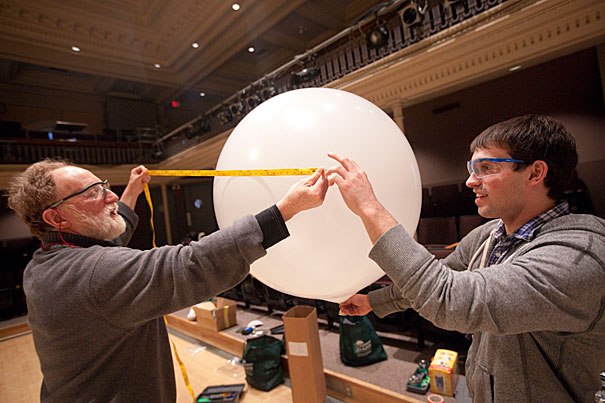
Barry Griffin (left), a visiting lecturer on design and design curriculum development, led a group undergrads on a winter break project to invent and construct a balloon-supported structure that could be used for lifting and/or shelter in the wake of disasters like last year’s earthquake in Haiti. Here, the prototypes are built in Lowell Lecture Hall.
Kris Snibbe/Harvard Staff Photographer
A break with the past
New January programs give students chance to explore
Liz Moroney’s winter break experience left her with a lot to digest.
“I wanted to participate in the food and wine trek in New York City because I come from a family of foodies and I was interested to see the breadth of careers in the food and wine industries,” said the Leverett House junior. “I love exploring new restaurants and dishes, but I could never see myself going to culinary school, so I wanted to see what other opportunities there were. The trek really changed my perception of the food industry. It’s not all just chefs and waiters.”
Like Moroney, Harvard undergraduates and College administrators are looking back on winter break 2011 to evaluate the plethora of new programming that was offered, and to think about where to go from here. One thing is already clear, however: The break provided an opportunity for experiences not usually available to students during the semester.
“Winter break programming was designed in part to give students a chance to get out of the classroom and explore,” said Harvard College Dean Evelynn Hammonds. “Hundreds of students took advantage of the time to find out about career options, learn a new skill, and engage in public service.”
Moroney was one of dozens of students who took part in the new January Treks — short trips that provide students with knowledge of careers, introduce them to important contacts, and allow them to ask questions of industry representatives. Robin Mount, director of career, research, and international opportunities at Harvard’s Office of Career Services (OCS), credited the new academic calendar for making treks possible and said the programs let students see what a job is really like on a day-to day-basis.
“When the new calendar came into effect, we knew it was time to start offering this programming,” she said. “It’s one thing to have someone come to campus and speak. It’s another to see and hear the New York Philharmonic rehearsing at Lincoln Center. You can’t get that kind of knowledge from listening to a panel discussion.”
Treks were held in New York City and Washington, D.C., on Jan. 13 and 14. Students visited the disaster room at the American Red Cross, the kitchen of the restaurant at the Gramercy Park Hotel, the Central Intelligence Agency, and the World Bank, among other locations. Gé Zhang went on the fashion trek in New York City. The sophomore, who visited the backrooms of Bloomingdale’s and the headquarters of designer Ralph Lauren, says he now has an understanding of the mainstream career path in the fashion industry.
“You spend one year as an assistant buyer, one to two years as senior assistant buyer, a year of planning, and, finally, promotion to a buyer managing millions of dollars,” he wrote on the OCS Tumblr blog. “The executives look for school, work experience, and extracurricular activities on resumes.”
Many of the January experiences were offered by Harvard alumni who volunteered to make themselves available. Robert Kraft ’76, president of 20th Century Fox Music in Los Angeles, offered to allow students to shadow him at work for a day, but got so many requests that he combined his offering with the yearly Harvardwood trek.
“Students responded quite late, only a few days before the Christmas week,” he said. “Suddenly, the requests tumbled in. I couldn’t accommodate them all, so I set up a group visit. Students came to Fox Studios, then to my office where I led them to a recording session for the animated show “Family Guy.” It made it possible for 25 Harvard undergraduates to have a January experience at a movie studio.”
Kraft called the time spent with students “rewarding” and said it made him feel energized. Philip Lovejoy, deputy executive director of the Harvard Alumni Association, says that Kraft’s sentiments were echoed by many of the 231 alumni who offered January experiences.
“Alumni really want to stay connected to the College, and there’s no better way to do that than to engage with students,” he said.
While OCS and Harvard alumni offered programming across the country, there was plenty going on in Cambridge as well. January saw the launch of Harvard’s first Optional Winter Activities Week, a period of mostly student-led sessions on and around campus that featured workshops on stand-up comedy, accounting, the history of blues music, and much more. Senior Eric Hysen, leader of the Hack Harvard incubator for student life web applications, said the entire undergraduate community may enjoy the fruits of his group’s labors.
“Hack Harvard went great!” he said. “A few projects have launched already, and others are launching in the next few days. Students can find a list — from an app that helps them reserve space on campus to one that sets them up with a friendly lunch date — on our website.”




